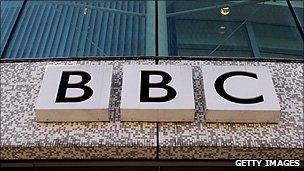TV licence fee should be scrapped, think tank says
- Published
Report author David Graham says it is time for the BBC to "think again" about the way it is funded
The television licence fee is "obsolete and unfair" and should be replaced with a voluntary subscription service for certain programming, a report says.
The growing use of the internet for viewing has made licensing TV sets outdated, according to right-wing think tank the Adam Smith Institute.
The BBC's current TV services could still exist with more flexible methods of funding, its report adds.
A BBC Trust spokeswoman said BBC funding was a matter for government.
Negotiations between the BBC and the government on the next licence fee settlement are due to begin next year.
'Global presence'
The Adam Smith Institute, known for its free market views, advocates in its report that the BBC should become "more ambitious and outward-thinking", arguing that would be easier without the licence fee.
It says continuing with the public subsidy will lead the broadcaster to be scaled back and "diminish its contribution".
The report singles out the success of Sky with its subscription model, adding that the BBC could have "the global presence of a Hollywood studio but with a wider range of output".
It recommends the BBC begins to look at how it could raise funds through subscription in 2012, and that licence fee payers be given the option to stop paying their fees two years after that.
The BBC should be given a fixed sum of money from the government to cover any initial losses, it suggests.
The institute has also called for what makes up the essentials of public service broadcasting to be redefined.
It currently includes areas such as news and children's programmes, which would remain free under its proposed new system.
But drama and entertainment output would require a subscription to be viewed were its proposals to be adopted.
'Critical time'
Advertising on the BBC is not ruled out in the report, but it acknowledges the broadcaster would prefer advert-free forms of revenue.
David Graham, the former BBC producer who wrote the report, said he hoped his findings would encourage "serious debate at a critical time".

The BBC is being held back by the licence fee, says the report
"It really is going to be very difficult for the BBC to resist the justifiable hostility of other competitors who just now, receiving no subsidy, have to bear the whole brunt of the... competitive market, cycles that go up and down," Mr Graham told BBC 5 live.
"You know ITV up against BBC really hasn't a chance in a difficult advertising environment and that really shouldn't be allowed," he added.
Culture Secretary Jeremy Hunt has indicated his support for continuing with the licence fee, but last month suggested it could be cut from the current £145.50 after the next negotiations.
Attacking the BBC's "extraordinary and outrageous" waste, Mr Hunt told the Daily Telegraph: "The BBC should not interpret the fact that we haven't said anything about the way licence fee funds are used as an indication that we are happy about it. We will be having very tough discussions."
The spokeswoman for the BBC Trust, which represents licence fee payers and governs the BBC, said: "The trust welcomes the fact that the current government has expressed its support for the continued existence of multi-year licence fee settlements.
"The trust remains focused on ensuring that licence fee payers are getting value for money."
- Published2 August 2010
- Published17 July 2010